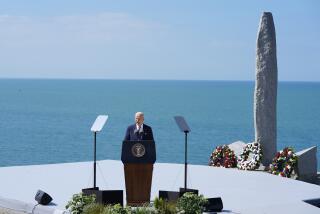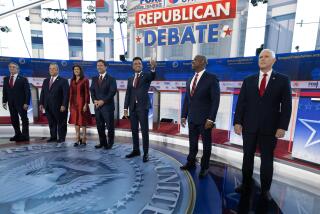Reagan at the Berlin Wall
With the 20th anniversary of the fall of the Berlin Wall, the tape of Ronald Reagan’s famous speech at the Brandenburg Gate is likely to be played and replayed. “Mr. Gorbachev,” he declared, “tear down this wall!”
But how significant was the speech, really? How important was its seemingly defiant tone in reuniting Berlin and “winning” the Cold War?
To many American conservatives, the answer to those questions is simple: Reagan stared down the Soviet Union. And the Berlin Wall speech stands as the dramatic symbol of Reagan’s challenge and triumph.
But those who say this ignore the actual history and context of the speech. In fact, Reagan’s address served the purpose of shoring up public support as he moved to upgrade American relations with the Soviet Union. It was Reagan’s diplomacy with Soviet President Mikhail S. Gorbachev, bitterly opposed at the time by his conservative former supporters, that did the most to create the climate in which the Cold War could end.
By the time Reagan delivered his Berlin Wall speech, in June 1987, he had already held two summits with Gorbachev and was moving toward two more. He was in negotiations for the arms-control treaty he signed later that year. In fact, during Reagan’s second term, he met five times with Gorbachev, more than any other American president had met a Soviet leader during the Cold War.
When Reagan won Senate ratification of the Intermediate-Range Nuclear Forces Treaty, it was the first arms-control treaty with the Soviets to win approval in 15 years. At a 1988 summit in Moscow, Reagan backed away from his famous remark five years earlier that the Soviet Union was an “evil empire.” He told reporters: “That was another time, another era.”
Reagan’s conciliatory policies toward the Soviets provoked anguished and increasingly bitter denunciations from the right wing.
Howard Phillips of the Conservative Caucus branded Reagan “a useful idiot for Soviet propaganda.” Conservative columnist George Will pounded away at Reagan for having changed. “Four years ago, many people considered Reagan a keeper of the Cold War flame,” he wrote in 1988. “Time flies. For conservatives, Ronald Reagan’s foreign policy has produced much surprise, but little delight.” Even Reagan’s vice president, George H.W. Bush -- when he ran for president in 1988 -- suggested that Reagan had gone too far in his diplomacy with the Soviet leader.
The Berlin Wall speech produced an intense fight within the Reagan administration. The speech was drafted by a young White House speechwriter, Peter Robinson, and was cleared by Reagan’s domestic advisors. Reagan’s foreign policy advisors balked at the “Mr. Gorbachev” line. They worried that it might undermine Gorbachev’s political position in Moscow, making him the target of hard-line elements within the Soviet leadership and weakening his ability to reach out to the West.
Reagan decided to leave the line in, judging rightly that Gorbachev could handle it. The speech served as a strong reaffirmation of the value of freedom and a reminder that, even as Cold War tensions eased, the United States would not accept the continuing division of Berlin, Germany or Europe.
Many Americans now assume the key part of Reagan’s speech was the idea of tearing down the wall. Ironically, that was nothing new. It was almost boilerplate for American leaders to say the Berlin Wall should come down. Reagan himself had said in Washington, a year earlier, “I would like to see the wall come down today, and I call upon those responsible to dismantle it.”
But it was quite a change for a U.S. president to directly appeal to “Mr. Gorbachev” to tear it down. That was new.
Reagan delivered the speech on the occasion of Berlin’s 750th anniversary. He was on a stopover in West Berlin that lasted only a few hours. What he said got the attention not so much of Gorbachev but of East German Communist Party leader Erich Honecker. Officially, the Berlin Wall was, after all, East Germany’s wall.
Needless to say, Honecker wasn’t about to tear down the wall. (He declared at the beginning of 1989 that the wall “will still exist in 50 or even 100 years.”) But still, he would have liked Reagan to ask him, not Gorbachev, to do so. By addressing the words to Gorbachev, Reagan was reminding everyone of the reality that East Germany couldn’t exist without Soviet support. In fact, Honecker, who would be forced to resign just before the wall fell, was increasingly convinced throughout the mid- and late-1980s that the Americans and Soviets were conspiring against him. (They weren’t.)
Some conservatives now argue that the Reagan-Gorbachev diplomacy was irrelevant to the unraveling of Soviet power. They credit his much more hard-line defense buildup and his Strategic Defense Initiative, hallmarks of his first term in office, with determining the outcome of the Cold War and forcing Gorbachev to capitulate.
Such arguments gloss over an important distinction. It was one thing for Gorbachev to decide that the Soviet Union could not compete with the United States in military terms. It was another for him to abandon the Cold War entirely, refusing to do anything to stop the changes that swept through Eastern Europe in 1989, culminating with the fall of the Berlin Wall in November.
The Soviet Union was, as the historian Stephen Kotkin put it, “lethargically stable.” Even if it couldn’t keep matching American military power, it still could have tried to preserve the essentials of what it had. It possessed more than enough nuclear weapons to fend off the West.
On the night of Nov. 9, 1989, as East Germans began streaming across the wall, Honecker’s successor, Egon Krenz, tried to call Gorbachev to ask what he should do. Gorbachev didn’t take the call, and he didn’t intervene. He wanted an entirely new relationship with the United States and Western Europe. Reagan’s diplomacy with Gorbachev had quite a bit to do with that.
After he left office in January 1989, Reagan pressed the new Bush administration for still better relations with Gorbachev. At a speech in Europe in June 1989, he said the new president should “take the risk that the Soviets are serious in their efforts to reach genuine arms reductions with the West.”
When the Berlin Wall came down five months later, everyone remembered Reagan’s impassioned, confrontational “tear down this wall” speech. Few recalled that Reagan’s actual policies, bitterly contested at the time, were aimed at courting Gorbachev, building up his stature and doing business with him.
More to Read
Sign up for Essential California
The most important California stories and recommendations in your inbox every morning.
You may occasionally receive promotional content from the Los Angeles Times.










